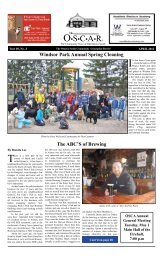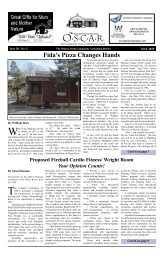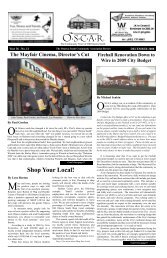You also want an ePaper? Increase the reach of your titles
YUMPU automatically turns print PDFs into web optimized ePapers that Google loves.
Page 12 The OSCAR - OUR 31 st YEAR OCTOBER 2005<br />
SECOND THOUGHTS<br />
Downfall – The End of the Reich<br />
Richard Ostrofsky<br />
Second Thoughts Bookstore<br />
quill@travel-net.com<br />
A<br />
few weeks ago, Carol<br />
and I saw a German film<br />
called Downfall (Der<br />
Untergang) at the Mayfair – a reenactment<br />
of the last weeks of<br />
Hitler and his henchmen in the<br />
Führerbunker in Berlin in March<br />
and April, 1945. This article is a<br />
response to the film itself, which<br />
we admired, and to some hostile<br />
reviews (amidst many favourable<br />
ones) found afterwards on the<br />
Web – particularly that by David<br />
Cesarani and Peter Longerich, two<br />
professional scholars of the war, in<br />
a review called “The Massaging of<br />
History” from The Guardian, April<br />
7, 2005. (You can easily find this<br />
C&L review with a Google search<br />
on the keywords: “Cesarani,”<br />
“Longerich” and “Downfall”).<br />
As a movie, the film is visually<br />
stunning, and superbly acted. The<br />
role of Hitler, played by Bruno<br />
Ganz, is altogether convincing.<br />
Much smaller parts, notably those<br />
of Joseph and Magda Goebbels,<br />
are also very well done. As a<br />
representation of history, the film<br />
is questionnable – at least insofar<br />
as Cesarani and Longerich are<br />
able to question it. For example,<br />
they complain that Traudl Junge,<br />
Hitler’s private secretary through<br />
whose eyes much of the story is<br />
told, was not the political innocent<br />
that the film asks us to believe.<br />
They are astonished (though I see<br />
no real contradiction here) that<br />
Waffen-SS General Mohnke whose<br />
unit massacred 80 captured British<br />
soldiers outside Dunkirk in May<br />
1940 and who later led a regiment in<br />
Normandy that murdered more than<br />
60 surrendered Canadian troops<br />
is depicted “as a humanitarian<br />
pleading with Hitler to evacuate<br />
civilians and arguing with Goebbels<br />
against the suicidal deployment of<br />
poorly armed militia against the<br />
Red Army.” Why a humanitarian?<br />
Why not just a brutal, ambitious<br />
general officer with enough sense,<br />
by 1945, to see that the jig was up?<br />
I am not competent to judge the<br />
film’s historical veracity. Its sins, as<br />
pointed up in the C&L review, are<br />
of omission rather than fabrication,<br />
as is not at all surprising. But<br />
I don’t quite grant the review’s<br />
charge that the film is slanted “to<br />
depict the German people as the last<br />
victims of Nazism” and to reinforce<br />
“the sense of Germans as guileless<br />
victims.” I think its message can<br />
more fairly be read as a study in<br />
political insanity. Indeed this is why<br />
I found the film of interest, and why<br />
I am recommending it: There are<br />
only a few real crazies in this very<br />
crazy situation. And even these few<br />
are insane or evil in very different<br />
ways, one from another. Most of the<br />
characters in the Bunker itself, as in<br />
the crumbling city above ground,<br />
are relatively normal human beings<br />
– doing desperate and horrible<br />
things to be sure, but mostly swept<br />
along by ambition, misguided<br />
loyalty, respect for authority, fear,<br />
desperation, or sheer force of habit.<br />
To me, the “ordinary Germans”<br />
in the film did not come off as<br />
“guileless victims,” but mostly as<br />
wretches and wretchesses who<br />
chose willingly to follow insanity<br />
and evil, made themselves its<br />
By Richard Ostrofsky<br />
One of the attractions<br />
at Second Thoughts<br />
Bookstore was Cayley, a<br />
long-haired calico cat who used to<br />
greet our customers by presenting<br />
herself to be scratched and petted<br />
before they were allowed to<br />
browse the books. Most loved her<br />
attentions, and more than a few<br />
came to our store mainly to look in<br />
on Cayley and play with her.<br />
When the store was empty she<br />
used to curl up with a book from<br />
almost any section and ponder it<br />
while awaiting her next admirer.<br />
At night, weather permitting, she<br />
used to range the neighbourhood<br />
hunting for mice and sparrows and<br />
bringing them home to play with.<br />
It was a good life.<br />
On Tuesday, September 13 th ,<br />
at about 10PM, her luck ran out.<br />
Crossing Sunnyside Ave. she was<br />
hit by a car. Some people at Second<br />
Cup saw it happen and called the<br />
Humane Society, not knowing who<br />
belonged to her. Meanwhile, four<br />
Our Loss<br />
willing instruments, and then, when<br />
the end came, responded to the<br />
collapse of their world in familiar,<br />
pathetically human ways.<br />
This re-enactment of the events<br />
in Berlin in 1945 set me to musing<br />
on ‘Dubya’s’ White House in<br />
Washington, sixty years later. In<br />
one case as in the other, we see a<br />
weird combination of self-deceptive<br />
idealism and cynical self-interest.<br />
We see a bunch of arrogant little<br />
men pretending to be masters of a<br />
situation that is plainly beyond their<br />
comprehension. We see a nation<br />
over-reaching, squandering its<br />
wealth and power, uniting a world<br />
against itself, and wrecking its own<br />
social fabric. We see a whole lot<br />
of very large, infuriated chickens<br />
coming home to roost.<br />
Hitler, completely out of touch<br />
with reality by March of 1945,<br />
is counting on a few no longer<br />
functioning army groups to relieve<br />
the siege of Berlin, and win the<br />
war in a final dazzling stroke.<br />
One is prompted to wonder what<br />
the American policy makers are<br />
counting on today.<br />
of our neighbours – Joyce, Fred and<br />
Leah Cocolicchio and Curt LaBond<br />
– recognized her, protected her by<br />
diverting traffic around her, and<br />
rang our doorbell to tell us what<br />
had happened. Then they stayed<br />
with Cayley, Carol and me until the<br />
pet ambulance came – which was<br />
and is greatly appreciated.<br />
At the animal hospital, Cayley<br />
was given anaesthetics, treated<br />
for shock, and X-rayed. No bones<br />
were broken, and she had no<br />
obvious injuries, but she remained<br />
unconscious from the anaesthetic,<br />
if for no other reason. We brought<br />
her home from hospital the next<br />
morning.<br />
On Wednesday the 14, she slept<br />
all day in the store, in a box beside<br />
my desk. Without really waking<br />
up, she could drink water avidly<br />
from an eye dropper, and lick a<br />
little mushed chicken from Carol’s<br />
finger. She seemed to be doing<br />
OK when we went to bed, but died<br />
during the night.<br />
She will be missed.










